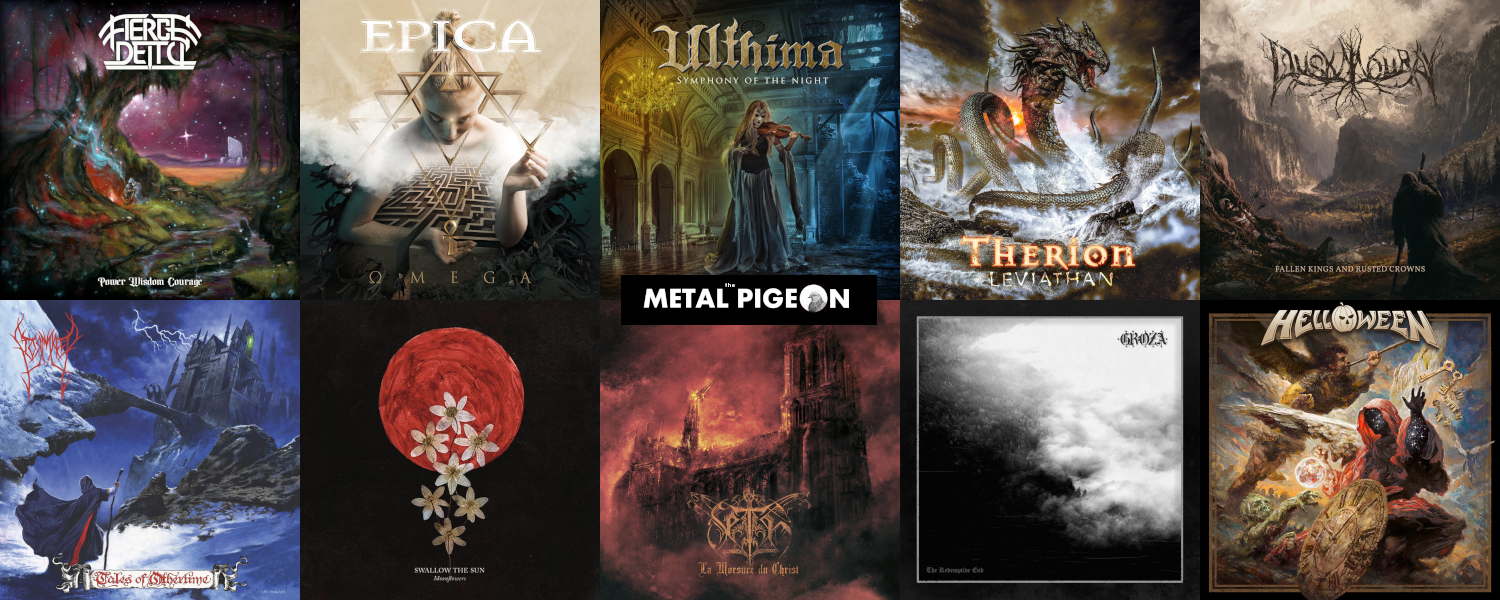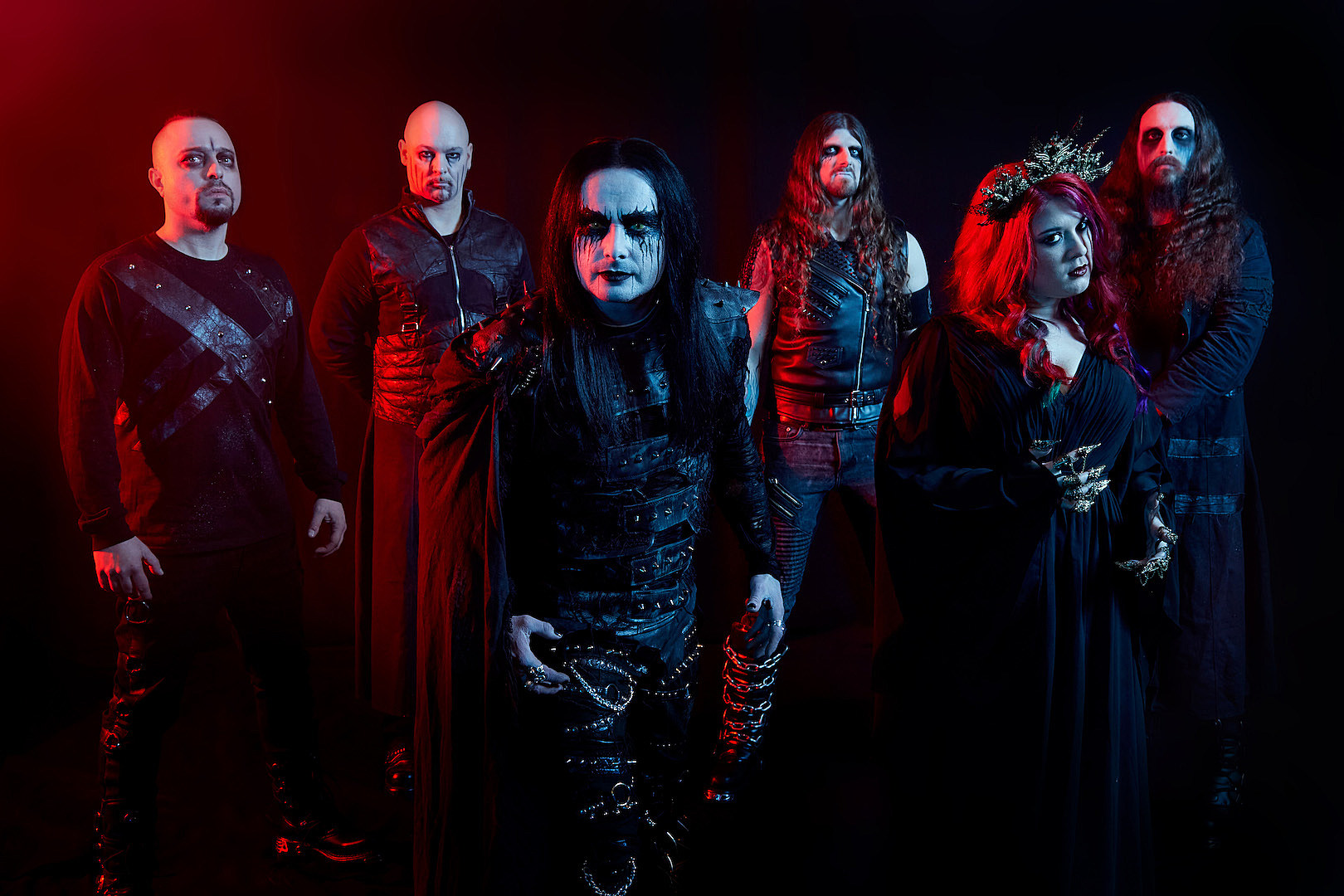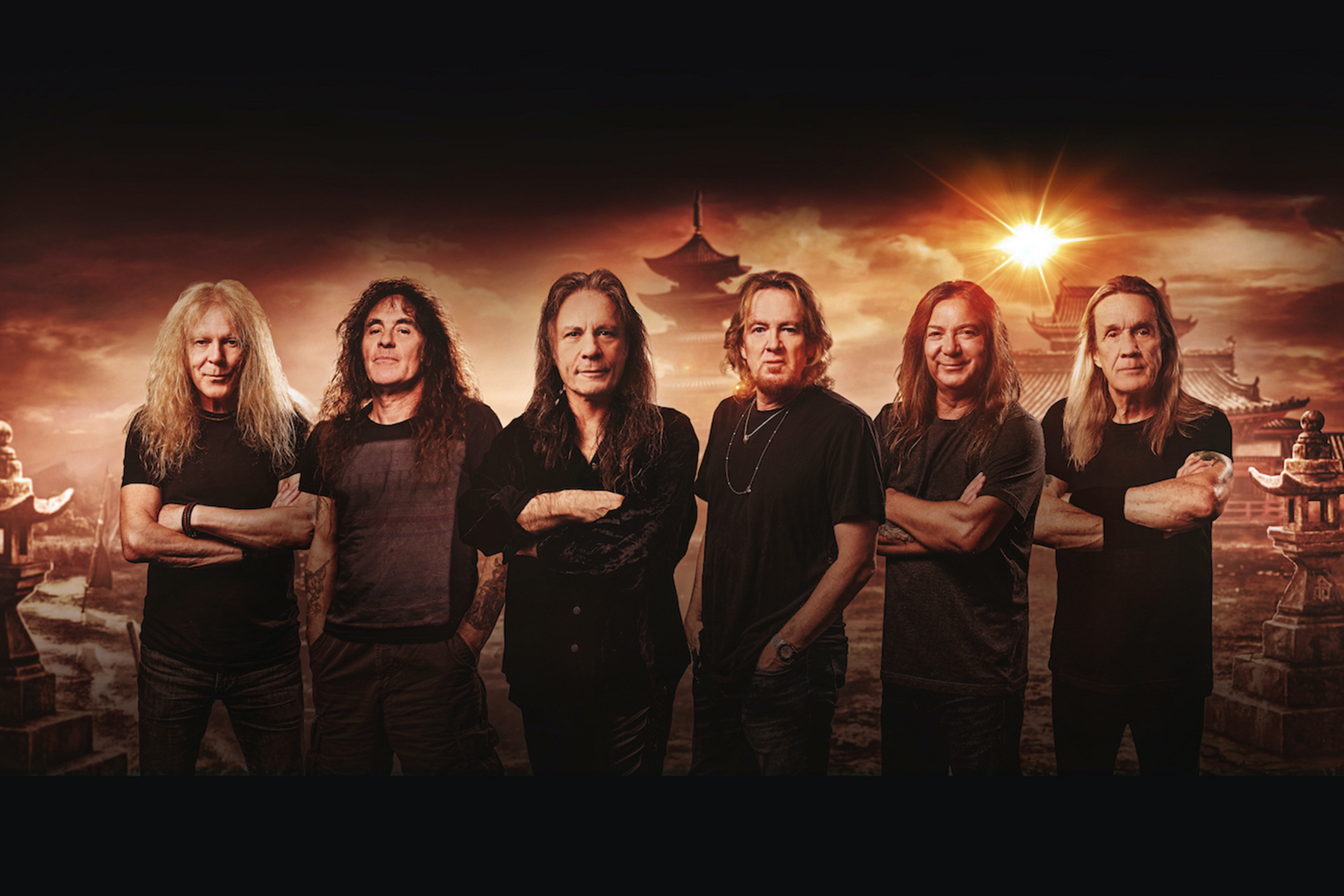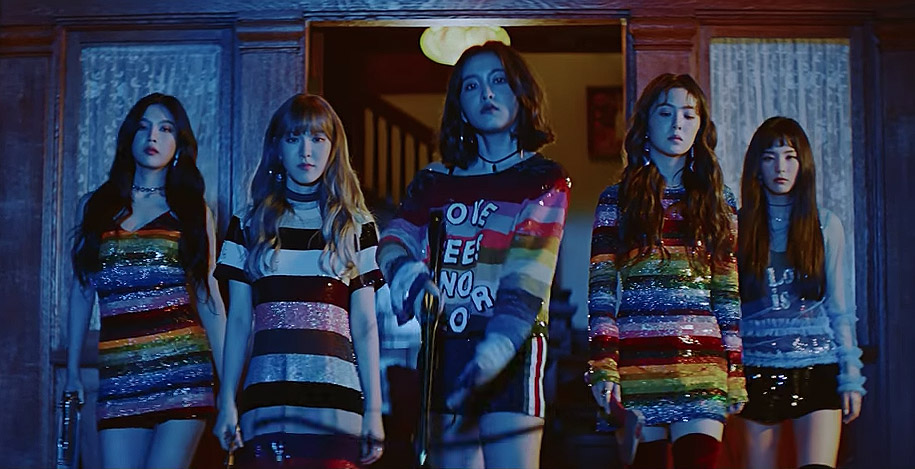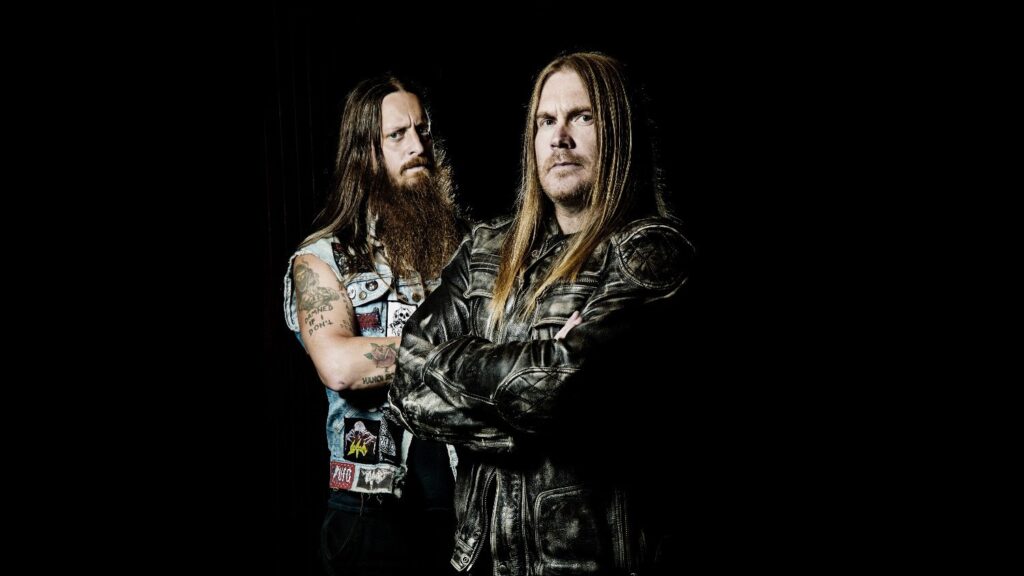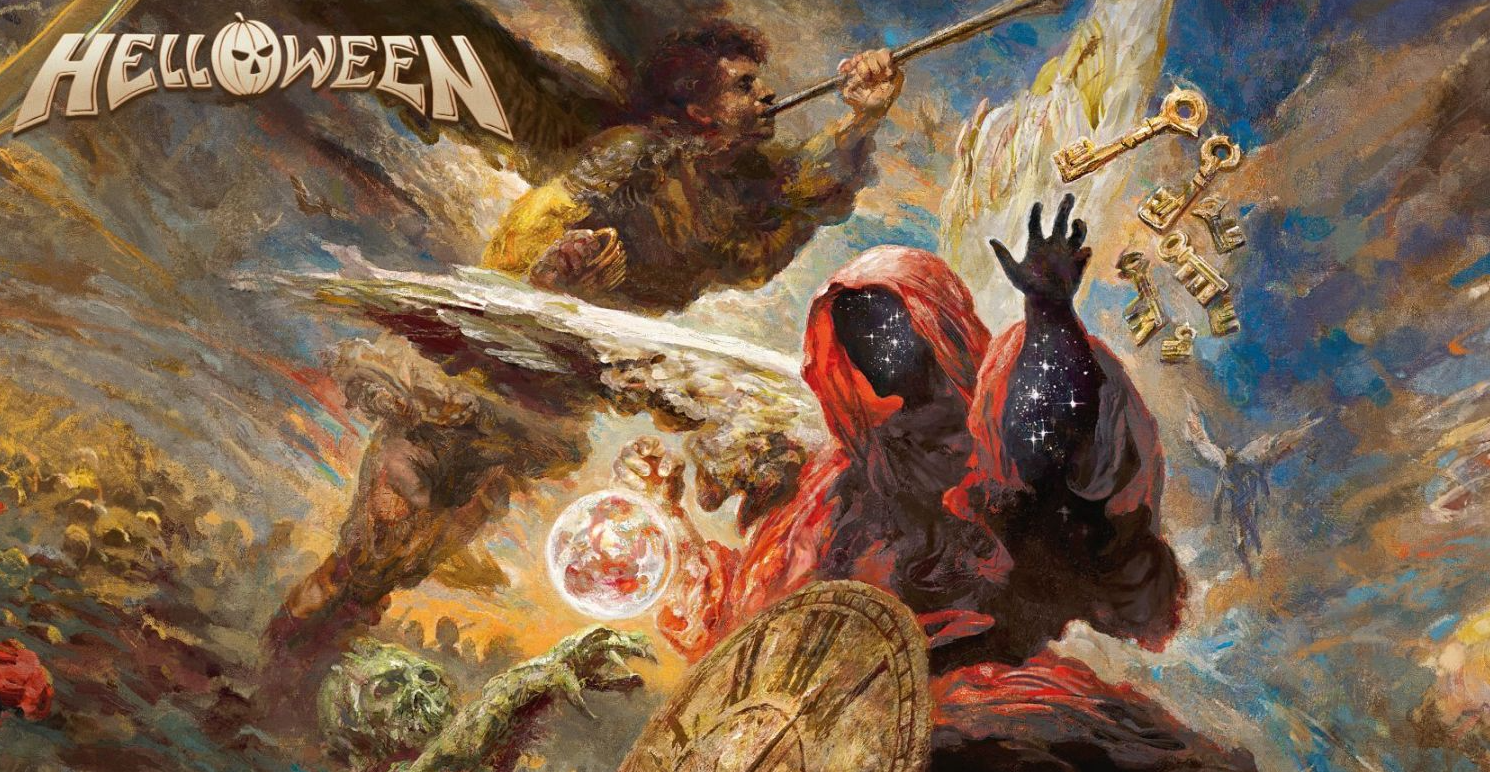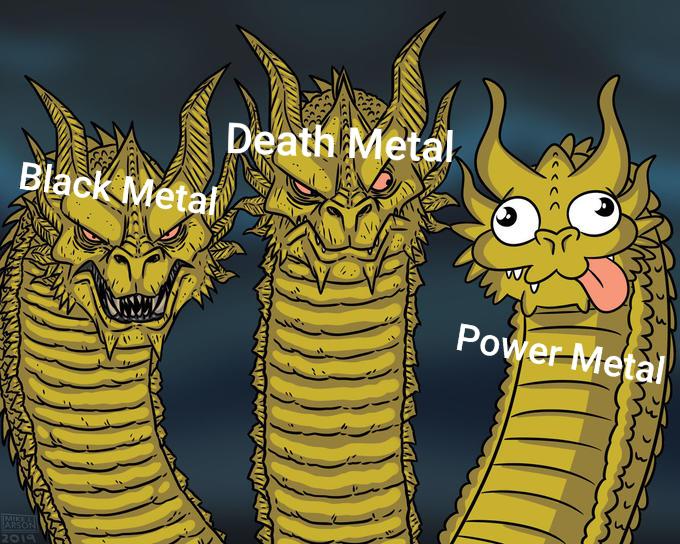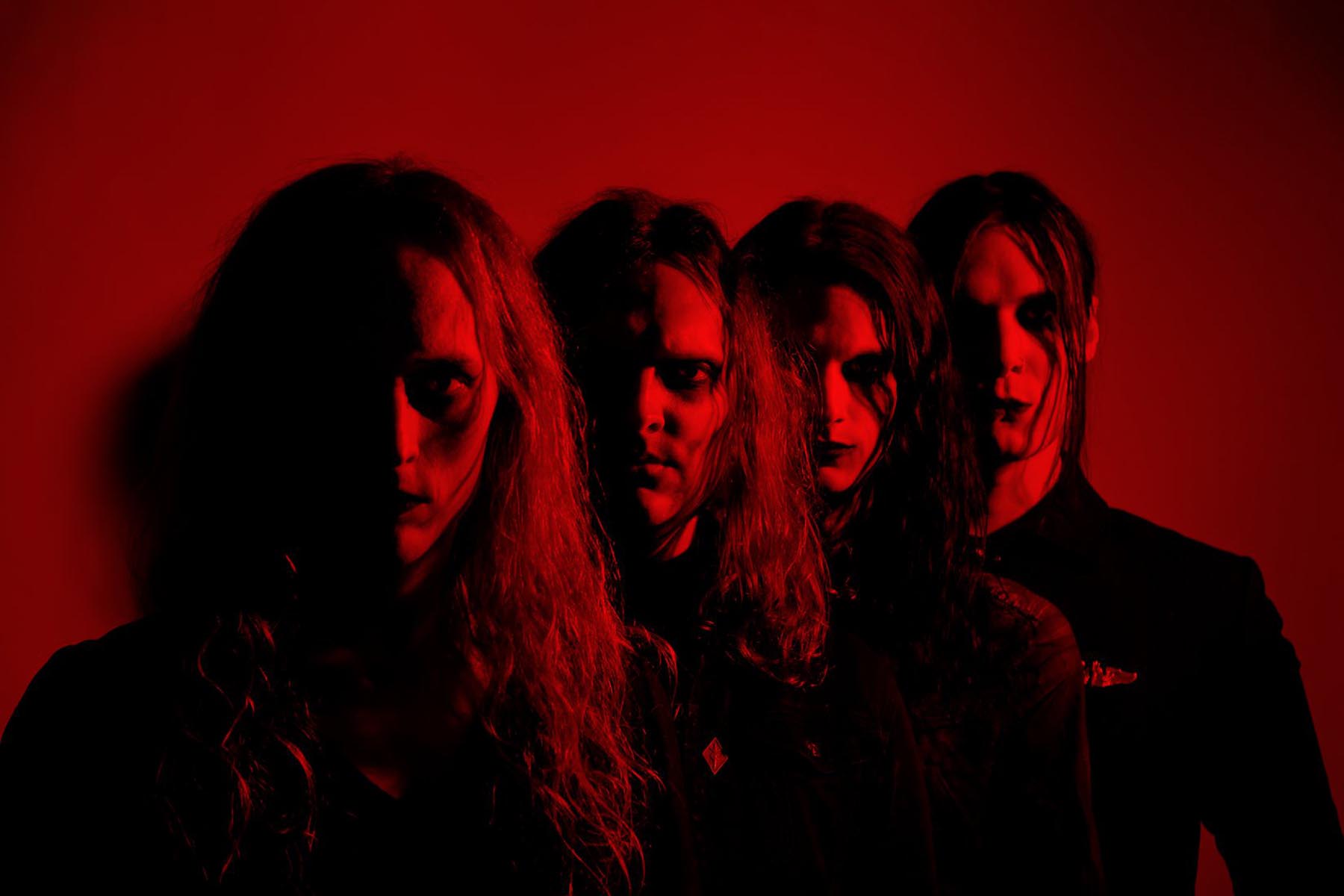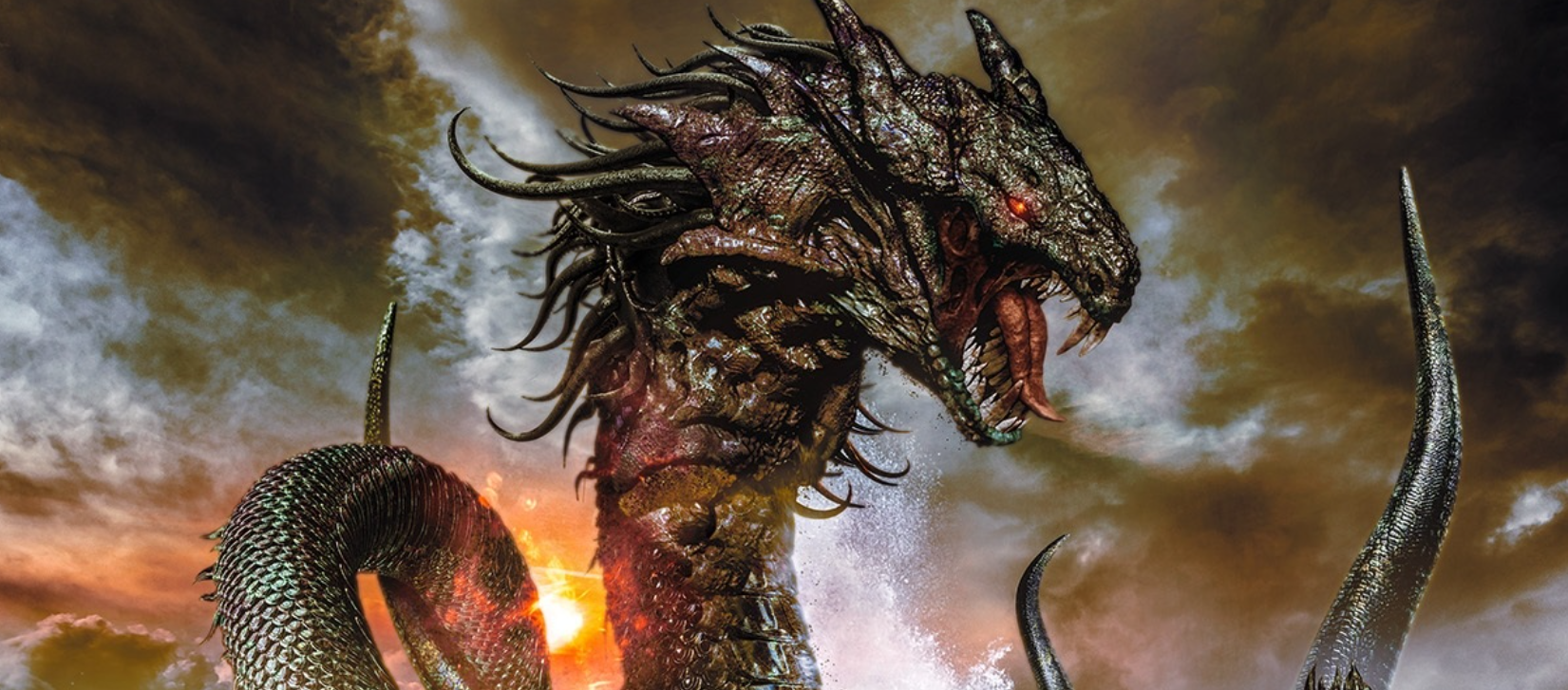
As I enter the tenth year of existence for The Metal Pigeon blog, its time to look back on a year that was undoubtedly strange, unexpected, and challenging for me as a music fan. To summarize it, I went through a period in the spring where I was feeling a little uninspired by most of the metal records coming out, and as a result started to check out different styles of music. I dove really hard into K-Pop in particular (and have kept diving), and had to figure out how to reignite a passion for metal that had all of a sudden felt a little stagnant. To the latter point, I figured out that a great tonic was to allow myself to escape the new release treadmill and simply revisit older classic metal records for fun. I also found out that when it came to new releases, my years long strategy of just slamming repeat listens of a record sort of by force was beginning to yield purely negative results. It was more prudent to wait until I was in the mood to hear something before giving it a spin, a process which definitely resulted in delayed reviews and even missing a few things, but better to slow down a little than feel burned out and stop entirely. All these months later, I feel like my connection with metal has become stronger, particularly through finding an refreshed appreciation for black metal again. As it turns out, when you spend a good amount of time ingesting super sugary music, what you really begin to crave as an antidote is it’s most extreme opposite. As a result, your musical perception is actually more open to appreciate the details and textures of extreme metal anew, rather than feeling like you’ve heard everything before. I suspect it’s a lot like if you scarf down a package of cookies in one sitting, your mind will have you yearning for I dunno, a salad the next day. The lesson learned here is that diversity is good, and balance even better — if you’re feeling a little unmoved by one style or another, check out something entirely different to change it up. This 2021 best albums list is a perfect example of how that can really have a dramatic effect.
1. Therion – Leviathan:

It’s a testament to how much I love Leviathan, that despite its late January release, it was my clear cut, without a doubt number one album all the way up until mid-summer, when the new Helloween album came out and I started to wonder if it would slip a bit. I questioned it further when in the late summer, I was getting a flurry of black metal recommendations tossed my way, and damn near all of them were direct hits, gripping my attention and dominating most of my metal listening time (which was in precious supply at certain points). But I would find myself returning to Leviathan regularly, in random moments when I didn’t even intend on playing the album all the way through, just a few songs here or there, to satisfy a craving to hear a particular melody or chorus. Spotify reminded me of this on December 1st when it presented me with my Your Top Songs 2021 playlist, and all the tracks from this album were on it (yes the whole damn album). Last.fm backs up the stats, Leviathan is my most listened to album of 2021 by well over a hundred listens compared to the album in second place, and my first rule of making these lists is to be honest with myself, even if it risks exposing me as a total fanboy. And look, I’ll embrace that title, because Therion’s first proper studio album of original material in a decade was a monumental event in the 2021 release calendar for me. This record had the added burden of being the follow up to first Therion album that I regarded as somewhat of a disappointment (2010’s Sitra Ahra). Fortunately Christofer Johnsson decided to abandon that album’s more avant garde/progressive tendencies and made a conscious decision to return to the band’s classic symphonic metal sound, even telegraphing in interviews ahead of the album release that this was an attempt at making a record that hardcore Therion fans would appreciate. And here’s the thing, he certainly succeeded in achieving that goal, but I believe that in doing so, he actually steered the band’s sound into a direction they’d not previously explored.
The beauty of Leviathan is that despite its overt look back to the band’s late 90s, post-Theli symphonic metal era, it’s a gaze that is undoubtedly refracted by the band’s gradual shifts in their sound over the course of all those albums between then and now. Where classic albums such as Vovin and Deggial were moody, dramatic, orchestral driven works, Secret Of The Runes was a jump to a heavier, almost hypnotic guitar driven approach. Their twin albums Lemuria and Sirius B were expansive, cinematic masterworks, almost panoramic in their scope and ambition. And then we saw the introduction of a new vocal driven era with Gothic Kabbalah, where for the first time the songwriting ran through some pretty incredible singers who had the ability to dominate songs through unforgettable vocal melodies. Even though releases since have been few and far between, this era has lingered; case in point, the band’s last release was the actual opera Beloved Antichrist, where guitars took a backseat to the stellar cast of classically trained singers who, you know, did their opera thing for most of those three discs. So no matter how pointedly Johnsson decided to look back at that particular late 90s era, the sound he wove together on Leviathan couldn’t help but be affected by everything in between, particularly the emergence of strong lead vocals as the band’s chief melodic force within the songwriting. This album’s most heart stirring moments are it’s most gloriously vocal driven ones — the eternity evoking choirs in “Die Wellen der Zeit”, Taida Nazraić’s achingly melancholic lament in “Ten Courts of Diyu”, Marco Hietala’s impassioned vibrato in “Tuonela”, Thomas Vikström’s mighty tenor with just a tinge of hard rock rasp on “El Primer Sol” — the list could go on. So much of this album feels fresh and new for the band, a spiritual renewal by embracing the past, a seemingly accidental forging of a new sound via the old axiom that you can never truly revisit the past again. I wonder if Christofer himself would be surprised at hearing a reaction like mine. Part of the beauty of nostalgia is melancholy, that longing for something that is elusive, but for me this album felt like a warm hug, it would always leave me strangely cheerful and hopeful in the moment, and that feeling would linger.
(Also appears on: The Metal Pigeon’s Best Songs of 2021)
2. Stormkeep – Tales Of Othertime:

I think for most of the first half of this year, I didn’t really know what I was looking for in metal as a whole. Sure there were anticipated albums from veteran bands I’d spend time pouring over, but in the grand scheme of things, I would listen to new releases of all stripes and most of it was really not leaving a lasting impression. And as I stated above in my introduction, my purely melodic cravings were being satiated in a big way by another genre of music entirely, so the fact that power metal as a whole was having an underwhelming year was compounding my feeling of aimlessness. I think it was somewhere around late summer, while swimming in a sea of K-Pop, that I realized I was feeling an occasional deep yearning to hear something that was it’s spiritual and textural opposite. This timed perfectly with my being introduced to a handful of really spectacular black metal records from friends of mine (some of which I discuss below). But the one that shook me the most was the late fall release of Tales Of Othertime by Stormkeep, a relatively new symphonic black metal outfit from Denver (a realm of majestic, snow capped mountains of its own, take that Norway!). Stormkeep won me over with their perfectly blended mix of 90s era Dimmu Borgir, Satyricon, and Emperor put through a Blashyrkh filter. Vocalist Issac Faulk (aka Grandmaster Otheyn Vermithrax Poisontongue because hell, sure why not?) delivers maybe the most entertaining and convincing black metal vocal performance of the past decade, working with a delivery that mixes razor sharp blackened shrieking with a surprising amount of enunciative clarity. His approach reminds me of vintage Shagrath ala Enthrone Darkness Triumphant, with a splash of Abbath’s guttural depths, a combination that makes for narrative magic — he sounds like he’s embodying the hooded character on the album cover, standing mountainside and recanting something terrible to the wind. The beauty of this album is that despite said frosty artwork and the generally bleak tone that the band achieves when going full on black metal tremolo/blastbeat mode, there’s a surprising amount of warmth being radiated from these songs. I feel it seeping through in the audible hum of the bass, the very Euro-power tinge to the keyboard arrangements (some very Blind Guardian vibes happening in places, particularly in the transitions to quieter passages), and just in the overall theatrical approach the band is favoring in these richly varied compositions. This is a perfect symphonic black metal album, to my ears anyway. It reminds me of when I first heard records in this style way back in the day, and how it made me feel at the time: Entranced, mystified, and transported somewhere else. More than any other year in the history of writing this blog, I needed to be reminded of that feeling once again.
3. Duskmourn – Fallen Kings and Rusted Crowns:

On a surprise recommendation from our notoriously non-metal music fan George Tripsas, I was introduced this past summer to New Jersey duo Duskmourn’s Fallen Kings and Rusted Crowns, who tap into a combination of metal styles that reach down to the very roots of what made me an extreme metal fan in the first place. There’s artfully crafted melodeath-ian lead guitars adorning expansive yet rustic, at times gritty blackened folk metal ala the early aughts, and most importantly, these songs just reverberate with me in a very physical, visceral way. So much of what started to put me off on black metal over the past few years is when bands make things too obtuse, too dense, or just too lost in their own meandering train of thought to reach out to the listener and form any kind of connection (I’m looking at you Enslaved). But listen to the first minute of “Deathless” here”, hitting us with a mix of complex black metal riffing, an incense-scented Summoning inspired epic keyboard arrangement, only to suddenly break way into a slamming heavy metal riff with thundering toms. As Halford once sang, get me locked in, get me headbanging in my desk chair. When I first listened to this album in my car, I was pounding my fist on the steering wheel to these drums. That gorgeous lead guitar solo towards the end — I mean there’s a reason why this tune ended up on my best songs list. On the title track, we’re ushered along by a stirring, majestic keyboard arrangement that acts as a melodic guide as the band rages underneath with undulating riff progressions and Walter Deyo’s charcoal blackened melodeath vocals. He and fellow guitarist Bill Sharpe keep these songs moving just enough, happy enough to plug a great riff a few times because of course you should, but introducing sharp contrasting variations in the song structure to allow tension to build and release, for melodies to blossom and breathe. Listen to how “The Sleeping Tide” changes a multitude of times throughout it’s 5 minute plus run time, exploding in a primal, anguished riff sequence towards the end. There’s a real Moonsorrow influence lurking throughout this record that harkens back to what made that band so staggering to behold in their best moments, particularly in their balancing of raw, primal, blackened aggression with beautifully complex, melancholic melodies. This is the band’s third album, they’ve clearly been honing their craft unbeknownst to me of course, but they found me when I needed them the most.
(Also appears on: The Metal Pigeon’s Best Songs of 2021)
4. Swallow The Sun – Moonflowers:

Two things can both be true: That we all wish the tragedy that informed these past two StS albums (and Hallatar, and Trees Of Eternity) never occurred in the first place, and secondly, that guitarist and main songwriter Juha Raivio has managed to create astonishing art out of his very deep grief. And truth be told, I didn’t really think that he could better 2019’s When a Shadow Is Forced into the Light (one that year’s best albums), but there is a very particular and distinctive kind of magic about Moonflowers that might have it firmly in the conversation of being one of the best Swallow The Sun albums of all time. And this does feel like a musical sibling to …Shadow…, from the lengthy clean vocal melodies, to the dreamy, cosmos pondering atmospherics and wistful acoustic guitars. But despite the similarities, I feel like this album is the inverse of it’s predecessor, it’s emotional peaks landing not on it’s most violent, surging cuts, but in its more calmer, reflective songs. Take the album highlight “All Hallows Grieve”, where Oceans Of Slumber’s Cammie Gilbert joins Mikko Kotamäki on a sublimely haunting duet, it’s emotional refrain one of those moments where a beautifully written melody is elevated by an unforgettable performance. Then there’s “Keep Your Heart Safe From Me”, where despite the surprisingly Hope-esque riff to start things off, suddenly shifts into a Katatonia-like ebb and flow, finishing with as dazzling a guitar solo as I can remember on any StS album. And I really loved the weirdly Queensryche-ian vibes of “The Fight Of Your Life”, sounding like a distant cousin of “I Will Remember” or “Silent Lucidity”, Kotamäki’s vocals filled with a warmth despite all the ghostly effects put on his voice. This was a listening experience that required a bit more patience than …Shadow…, it’s pacing more subdued, it’s mood a little less anguished and violently reactive. It resulted in an album that seems out of time, particularly in the classical trio instrumental version that Raivio reworked, recorded by Trio Nox at Sipoo Church in Finland. I consider those pieces to be an extension of the album itself, instead of merely bonus tracks, because they have an entirely different emotional tenor to them despite working with mostly the same melodic structure. They made an already powerful album that much more emotionally engaging, and might be the most substantive “deluxe edition” addition in metal to date. To be sure, this was the most contemplative, inward looking album on this list in a year full of it’s exact opposite, a strange oddity that lived up to it’s namesake.
5. Fierce Deity – Power Wisdom Courage:

Every year there seems to be that band that comes out of nowhere and just levels me with a left hook through their awesomeness. Australia’s Fierce Deity was that band in 2021, it’s lone member Jonathan Barwick wowing me not only with this glorious masterpiece, but with his June release of The Trials Unmasked EP, a rustic, rootsy, Americana-informed reworking of his previous metal songs released over the past few years (you have to hear this one). I say songs because since Fierce Deity’s start in 2019, he’s been doing only digital single releases. But Power Wisdom Courage is his first all original EP release, a three track, 32 minute masterpiece that is his first complete statement, a fully realized musical journey that is audacious in its attitude, unapologetically trad metal, and tinged with a gorgeous streak of psychedelia. Of course you’ll likely recognize the album title as a reference to The Triforce from Zelda, and the band name pulled from a power-up found in Majora’s Mask, and to be sure, Barwick loves videogames and doesn’t shy away from hiding any it. He seems to occasionally go live on the Fierce Deity YouTube channel where he’s streaming himself playing and talking all things gaming (most recently seen playing Dark Souls III). But here on this record, he orchestrates a thunderous, bluesy hard rockin’ heavy metal assault with the kind of thick riffing that is at once anchoring and propulsive. How he manages to concoct an atmosphere that is rollicking as if a full band is jamming at once is beyond me, but even the drums, if indeed programmed, feel live and convincing. And this songwriting is enthralling, “Power” has a hook that won me over from the first time it graced my ears, and Barwick really understands how to write for his vocal type. He’s got a strong voice, full of character, a tone that registers more on the laid back, bellowing approach rather than the full throated going for the jugular attack of say Visigoth’s Jake Rogers. He describes his music as Stoner Power Metal on the Fierce Deity Bandcamp page, and that tag comes alive for me whenever the dreamy, stargazed atmospheric interludes pop up. They’re not distracting, they’re interwoven so deftly into the fabric of these songs that I can’t imagine them without, and their inclusion is a bold step for the band’s sound… moving beyond the more traditional metal approach heard on a cut like “Hearing Whispers” a few years ago. What excites me about Fierce Deity is that Barwick has found a truly authentic voice of his own, and it seems to have come naturally and without artifice. I love that he focuses on quality over quantity for his releases too, a concept I’ve seen work spectacularly well in K-Pop. Smaller focus, sharper execution. Make no mistake, this was the most exciting power metal release of the year.
6. Helloween – Helloween:

There was a moment there when I thought this would have sat atop this list at the end of the year. First off, it truly is one of the best albums released in 2021, and genuinely the best reunion album since Maiden shocked our collective faces with Brave New World (I know that there’s a few folks out there that would balk at this statement, sorry Dr. Metal!). That this record wasn’t an unfocused disaster given how it was constructed, with a multitude of band members taking turns handling songwriting duties over a pretty broad expanse of time, is quite frankly astonishing. Plans like this are supposed to result in plodding, mediocre messes, not an album that sounds like it was crafted with a laser focused precision by the band’s best songwriter. I was giddy on release night, staying up way too late to jam this over and over again, and it really was a euphoric experience to behold a veteran band hitting a grand slam this late in their career. That it sits here at number six on this list speaks more to the fact that I kinda burned myself out on it really quickly through the summer, and my other musical interests found myself reaching for more darker, abrasive forms of metal (see nearly everything else on this list) rather than the lighter shades found on this record. That being said, I still feel charged up when I hear “Out For The Glory”, an album opening, door-kicking in anthem that has one of the best Kai Hansen vocal drop ins ever. Michael Kiske and Andi Deris are incredible when they get to bounce off each other with vocal interplay as on “Fear Of The Fallen”, and Deris may have the best moment on the album on the ass-kicking “Mass Pollution”. I need to shout out one of my personal favorites here in “Down In The Dumps”, a song that is a sweet balance of Walls Of Jericho era riffing and latter day pop candy Helloween, with a chorus that I found myself shouting along to in car rides (a pretty good sign of my approval). Of course there’s the strange and utterly surreal “Skyfall”, a song that is so packed with classic Helloween charm that you can’t help but smile at it’s audacious nature, particularly that David Bowie invoking bit in the middle. Don’t let the positioning on this list fool you, I loved the heck out of this album, but there was just so much competition for my listening time that it slipped down the ladder a bit.
7. Ulthima – Symphony Of The Night:

This was one of those sneaky records that quietly burned up a ton of my listening time without me truly realizing it until I started looking at my play counts. But seeing those stats immediately brought to mind memories of me jamming this on my headphones during nightly walks, in the morning on my commute, on the drive home from work, etc. It would pop up intermittently, a tonic for a craving for all things melodeath. I actually think I listened to so few melodeath records this year because I was spending all my time bouncing between this and Duskmourn. If you’re unfamiliar, Ulthima are a Finnish-Mexican six piece who hit that sweet spot of Finnish melodeath that pulls from Children Of Bodom, Norther, and a little splash of early Kalmah in the way they balance aggressive elements with major key chord sequences. Just like Fierce Deity, there is a tangible videogame influence shining through this music, with cuts like “Black Swan” reverberating with shades of the Castlevania OST that the album title is referencing. It goes without saying that the title track here is a musical ode to that game, and really does somehow pull in major videogame music vibes through it’s melodies without resorting to cheap trickery like a random chiptune drop in. There was just something very satisfying about the listening experience on Symphony Of The Night, it brought tons of ear candy in it’s ultra melodic riff sequences, skillful lead parts, and the vocalist here, one Tuomas Antila has a real early Petri Lindroos quality to his delivery that I guess I’ve been missing from the man himself in Ensiferum lately. I wish I had something more poetic or insightful to say about this one, but sometimes an album is one of the year’s best because it just plain rules hard.
(Also appears on: The Metal Pigeon’s Best Songs of 2021)
8. Groza – The Redemptive End:

I suspect this will be on many folks’ year end lists (I know they’re all out, I haven’t looked at any yet!), because it just has that unmistakable quality of being undeniable. This came to me by way of an emphatic recommendation from friend of the podcast Justin The Metal Detector, and I’ll be honest, at first I was unmoved when listening to it. But a realization I’ve come to this year is the art of timing when it comes to listening to a record, so rather than dismissing it, I waited until I felt the need to hear something like it. That eventually came crawling, a desire for something bleak, unforgiving, and brutal to work as a palette cleanser for my aural sugar overdose. And one morning with the headphones on at work, it happened, this album was the black metal celery stick I needed and I was blown away. I think what I really enjoy about this record is that its not all bottom end or alternatively, high end screeching, but a well engineered variance of both and everything in between. Groza’s lead guitars hit those tinny registers on emphatic, punctuating tail ends of riffs, but its purposeful, with an aim to lock you into a hypnotic rhythm. Meanwhile there’s a black tornado of a rhythm section pummeling away below. There is obviously a huge debt to Mgla (and Uada… Groza are big on wearing hoods too) here, and of course I’m sure comparisons are being made between the two groups in almost every article written about them. I have no opinion on the subject really, but I can say that no Mgla album had me coming back for repeat listens as much as The Redemptive End has. And maybe this is just a purely personal anecdote, but I loved this album for it’s straightforwardness and almost monotone nature, the latter a quality I’ve dinged other bands with as a negative before. I dunno how to explain myself on that one — I just needed this album this year, among other terrific black metal releases. My chief takeaway for 2021 metal wise is that I was thrilled to be thrilled about black metal again, because it had been a damn long time.
9. Seth – La Morsure Du Christ:

In my personal black metal renaissance this year, I listened to quite a few really impressive albums, some of which I won’t be talking about here at year’s end because you know, ten spots only. But during the process of elimination, I had a hard time trying to justify not including La Morsure Du Christ from France’s longtime black metal institution Seth. I’m a little disappointed in myself that I hadn’t known about these guys before, they’ve been around since 1995 and apparently had a comeback on Season Of Mist in 2013. Unlike other French black metal names like Alcest and Deathspell Omega and Blut Aus Nord, Seth prefer a more straightforward, obliterate everything in their path approach to black metal. Their sound owes a lot to Mayhem, and perhaps in contemporary terms, to Taake and Watain as well, a furious assault that frequently boils over into nigh utter chaos. What I found surprising then, given that sonic profile, was how listenable this album was. The production here is stellar. The mixing providing enough balancing between instruments to discern melodies that are pushed to the background by design, and for anchoring riffs to have enough visceral intensity right up front to prevent this from just turning into a wall of noise. There are certainly some Alcest vibes happening on the rhythmic structure in “Sacrifice de Sang” however, and in that spirit Seth display an eyebrow raising amount of variance within their songwriting throughout this album. My favorite of these random moments are the interjections of surprisingly lush, pristine beauty, often tucked away as an end of song palette cleanser, such as the serene acoustic guitar/piano lullaby at the end of “Hymne au Vampire (Acte III)”. France has been full of surprises on the metal front lately, across the spectrum of heavy music, and it was nice to be reminded of that yet again.
10. Epica – Omega:

What a massive surprise this was. Epica, a band that I had come to ignore over the years because every attempt to get into them fell flat, released an album that I genuinely thought was stellar. After Therion, it’s the next best symphonic metal album of the year, and certainly the best Epica album to my ears anyway (I have no frame of reference on whether or not most Epica fans share this opinion by the way). I think I was somewhat in denial about how much I liked this album at first, thinking to myself “Ah I just like a few songs here and there”, but when a “few songs” wind up being most of the damn album… even I had to check myself and give the band it’s due. This album edged out yet another black metal record for the final spot on this list, and I seriously considered leaving this off until I let the stats speak for me and realized this was one of my most listened to albums of the year. Being a late February release, it was also one of the few bright spots from the first half of this year, and it was something I would return to often throughout the rest of 2021. I suspect that what Mark Jansen and Simone Simons and company stumbled upon here is addition by subtraction, because correct me if I’m wrong, but this feels like a leaner, less orchestrally driven Epica. These songs are very riff forward, vocal melody driven affairs, with the symphonic elements shading in the colors around them with restrained, often scaled back arrangements. I realize that’s a silly thing to say about what is still essentially a symphonic metal album, but in my memory, Epica used to run amok with their reliance on that aspect of their sound, to the detriment of their songwriting. Maybe I’ll revisit their discography to find that I’m wrong about that and it’s only that I’ve unlocked my brain into enjoying what has always been their sound, but I suspect that I’m right — that the band has shifted their approach here in subtle but important ways. These are tremendous songs, “Seal Of Solomon” is a perfect juxtaposition of brutal and cinematic elements; “Abyss Of Time” wisely rides one of the band’s strongest melodies in my memory; and “Rivers” is incredibly beautiful, a song that stopped me in my tracks. A start to finish satisfying traditional symphonic metal listen, it’s nice to have my own perceptions of a band changed all these years into their career.
(Also appears on: The Metal Pigeon’s Best Songs of 2021)

